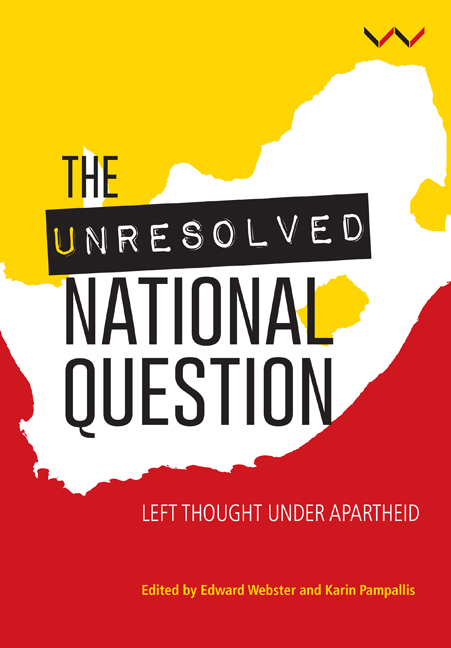Book contents
- Frontmatter
- Contents
- Acronyms and Abbreviations
- Preface: Edward Webster and Karin Pampallis
- Introduction: Revisiting the National Question
- PART ONE KEY FOUNDATIONAL TRADITIONS
- PART TWO CONTINUITY AND RUPTURE
- Chapter 6 Vicissitudes of the National Question: Afrikaner Style
- Chapter 7 Neville Alexander and the National Question
- Chapter 8 The Marxist Workers’ Tendency of the African National Congress
- Chapter 9 The National Question confronts the Ethnic Question
- Chapter 10 Variations on a Zulu Theme
- Chapter 11 Black Consciousness as Nationalism of a Special Type
- Chapter 12 Postponing the National Question: Feminism and the Women's Movement
- Chapter 13 Workerists and the National Question
- Chapter 14 Red, Black and Gold: FOSATU, South African ‘Workerism’, Syndicalism and the Nation
- Chapter 15 National Democratic Revolution meets Constitutional Democracy
- Biographical Notes
- Index
Chapter 13 - Workerists and the National Question
from PART TWO - CONTINUITY AND RUPTURE
Published online by Cambridge University Press: 21 April 2018
- Frontmatter
- Contents
- Acronyms and Abbreviations
- Preface: Edward Webster and Karin Pampallis
- Introduction: Revisiting the National Question
- PART ONE KEY FOUNDATIONAL TRADITIONS
- PART TWO CONTINUITY AND RUPTURE
- Chapter 6 Vicissitudes of the National Question: Afrikaner Style
- Chapter 7 Neville Alexander and the National Question
- Chapter 8 The Marxist Workers’ Tendency of the African National Congress
- Chapter 9 The National Question confronts the Ethnic Question
- Chapter 10 Variations on a Zulu Theme
- Chapter 11 Black Consciousness as Nationalism of a Special Type
- Chapter 12 Postponing the National Question: Feminism and the Women's Movement
- Chapter 13 Workerists and the National Question
- Chapter 14 Red, Black and Gold: FOSATU, South African ‘Workerism’, Syndicalism and the Nation
- Chapter 15 National Democratic Revolution meets Constitutional Democracy
- Biographical Notes
- Index
Summary
INTRODUCTION
The early 1970s saw the re-emergence of the non-racial trade union movement after decades of repression by the apartheid regime. Its sustained and effective effort carried through to the present day. This chapter will examine one of the major groupings within the resurgence: the Federation of South African Trade Unions (FOSATU), and its antecedents. FOSATU went on to form the core of the Congress of South African Trade Unions (COSATU) launched in Durban at the end of 1985.
FOSATU tended to place a heavy emphasis on shop-floor organisation and plant-based bargaining. As a result, critical activists often saw it as being syndicalist in orientation or, in the term coined in the 1980s, as ‘workerist’. This chapter will assess the nature of the organisational form more carefully and identify what it offers in regard to the National Question.
The revival of non-racial trade union organisation was relatively widespread. The initial leadership was an interesting combination of experienced cadres coming off ‘the island’ (that is, activists who had been imprisoned on Robben Island), key officials in the registered unions, young left-wing intellectual activists, and a courageous and determined worker leadership that emerged out of intense – largely spontaneous – strike action. This combination was undoubtedly important in many ways.
FOSATU, formed in 1979, evolved and implemented a specific organisational approach. This was articulated in some detail in the Second FOSATU Congress in 1982, where an embryonic political philosophy can also be detected. This Second Congress coincided with a re-emergence of mass-based community action – the United Democratic Front (UDF) was formed the following year. There were distinct differences in approach of FOSATU's organising and that of the UDF, which led to a vigorous debate in the mid-1980s, usually styled ‘populist versus workerist’ – tags that masked more than they informed.
THE NATIONAL QUESTION AND WORKERISTS?
The National Question has long been a vexed issue within left thinking. It would be all too easy to tag the workerists as an expression of syndicalism and thereby conveniently disqualify them from such a grand dialogue. Although the workerists were not syndicalists, for many observers what they saw looked very like a form of syndicalism.
- Type
- Chapter
- Information
- The Unresolved National Question in South AfricaLeft Thought Under Apartheid, pp. 235 - 253Publisher: Wits University PressPrint publication year: 2017



